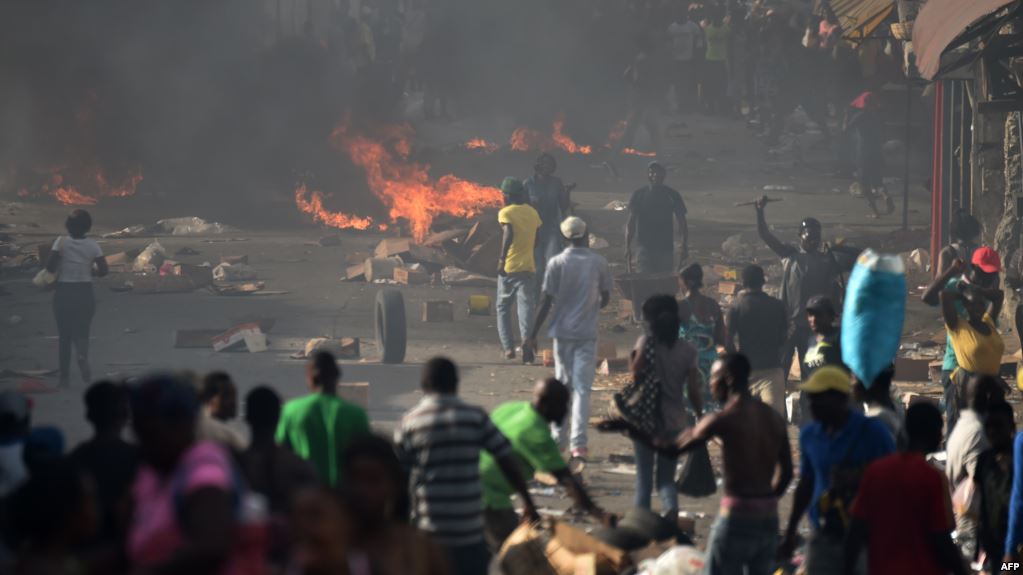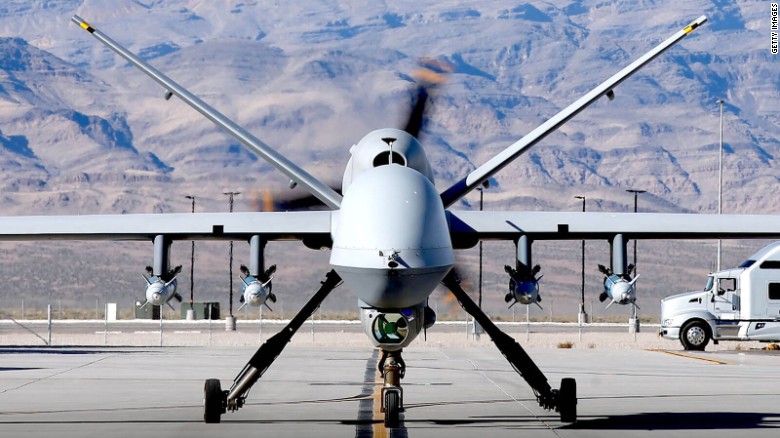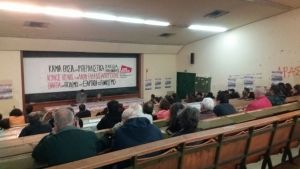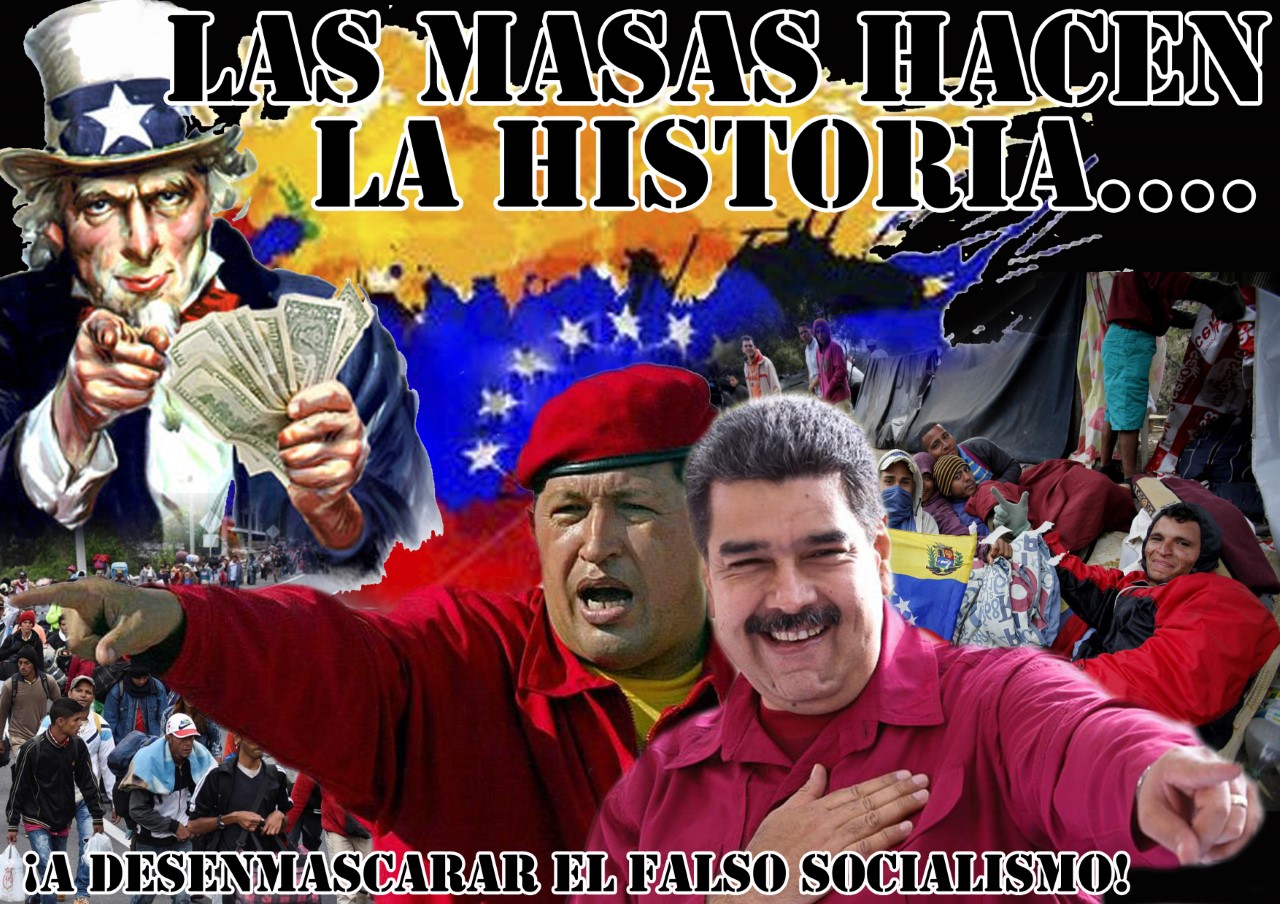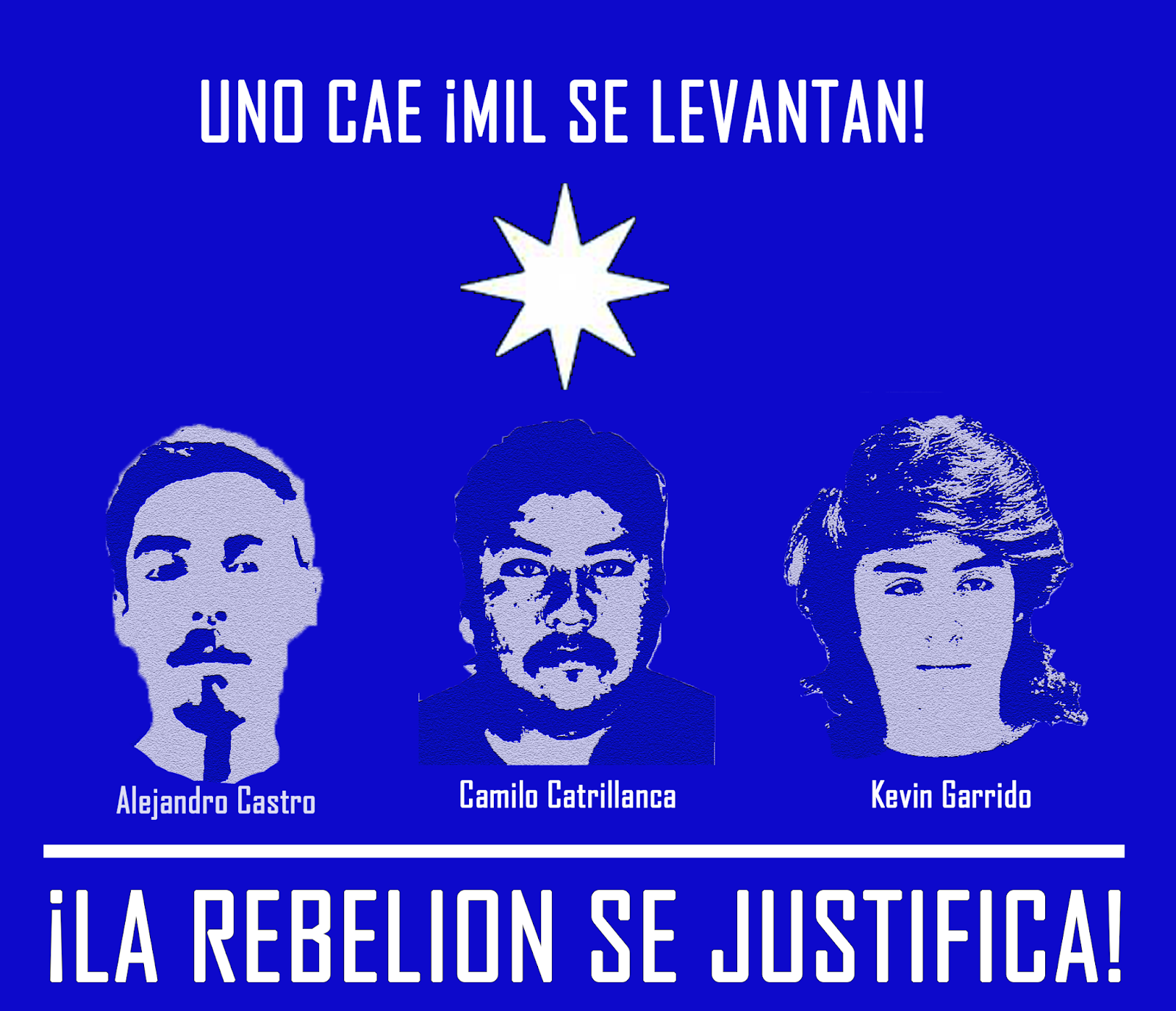Nachrichten
Nachrichten
- Details
- Category: Lateinamerika
On November 24, Thousands of workers and youths violently protested in the capital of the country, Port-au-Prince, demanding punishment for the corrupt and against the situation of the country. They also demanded the resignation of the current semi-colonial president, Jovenel Moise. This was the sixth consecutive day of protests.
- Details
- Category: Nordamerika
Since some months comrades of the People’s Revolutionary Defense Units in Los Angeles develop work with the mostly immigrant street vendors around Exposition Park in the south of the city. In the past, time and again arbitrary attacks and harassment occurred there through the hands of the Integration and Customs Enforcement – ICE, the Los Angeles County Department of Public Health (responsible for example for detaining and returning of supposedly "illegal" workers) and the Cops. After the most recent attacks against the streets vendors and especially the detention of a activist for the struggle against the harassment a number of actions were carried out in solidarity.
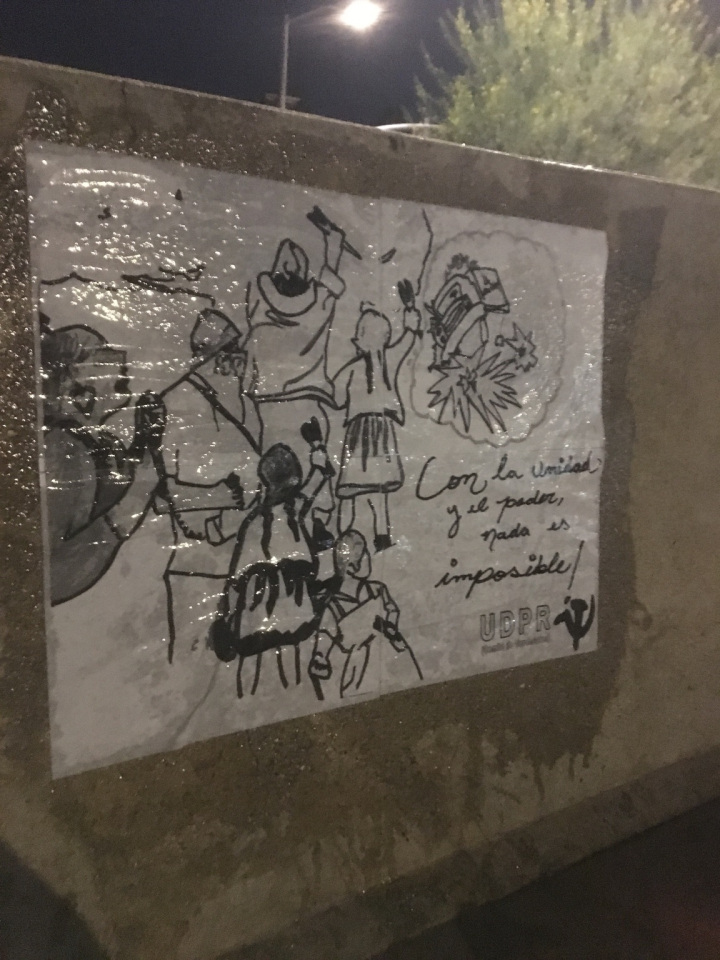
Close to a hundred street vendors, mostly with Mexican background, work and sell their wares around the area close to the stadium and the university in LA that is called Exposition Park. In the past years, cops and other bodies of administration frequently carried out raids, confiscations, arrests and other racist assaults against the masses working there. Hence, since some month comrades there organize the People’s Revolutionary Defense Units, or Unidades de Defensa Populares Revolucionarias – UDPR, among the masses working there. Since then, the agencies and cops were prevented to take carts and wares of those working there and to arrest vendors. Especially through organizing solidarity among one-another and through political mobilization, but also through masked units regularly patrolling the area, assaults could be prevented in the most recent months that led to a situation, in which the bodes of administration fear to enter the area without support.
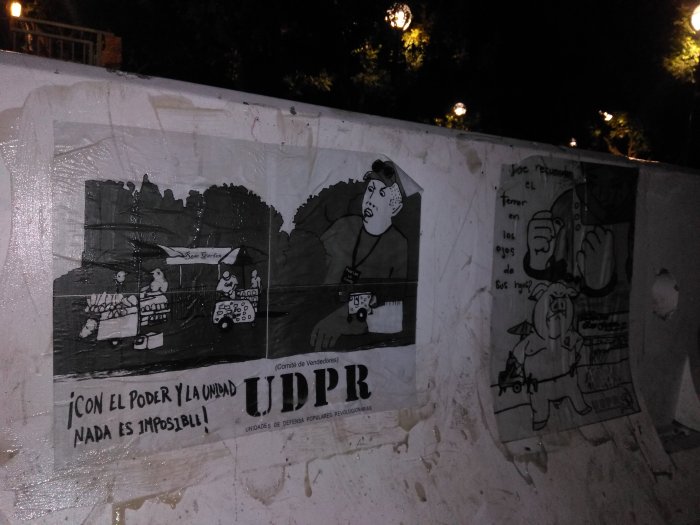
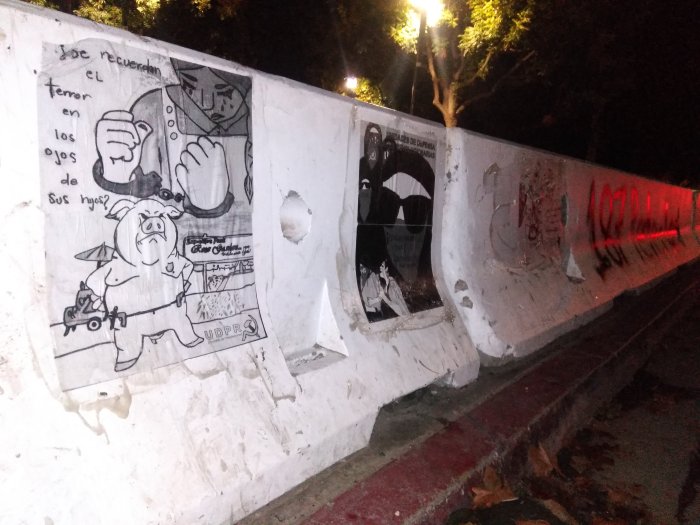
After the targeted attack of the cops against a leading activist of the streets vendors and a sympathizer of the UDPR the week before last, that led to a arrest and charge, for she supposedly hit a pig, now a number of Dazibaos and wall paintings haven been made by activists of the UDPR to call of solidarity and further organization.
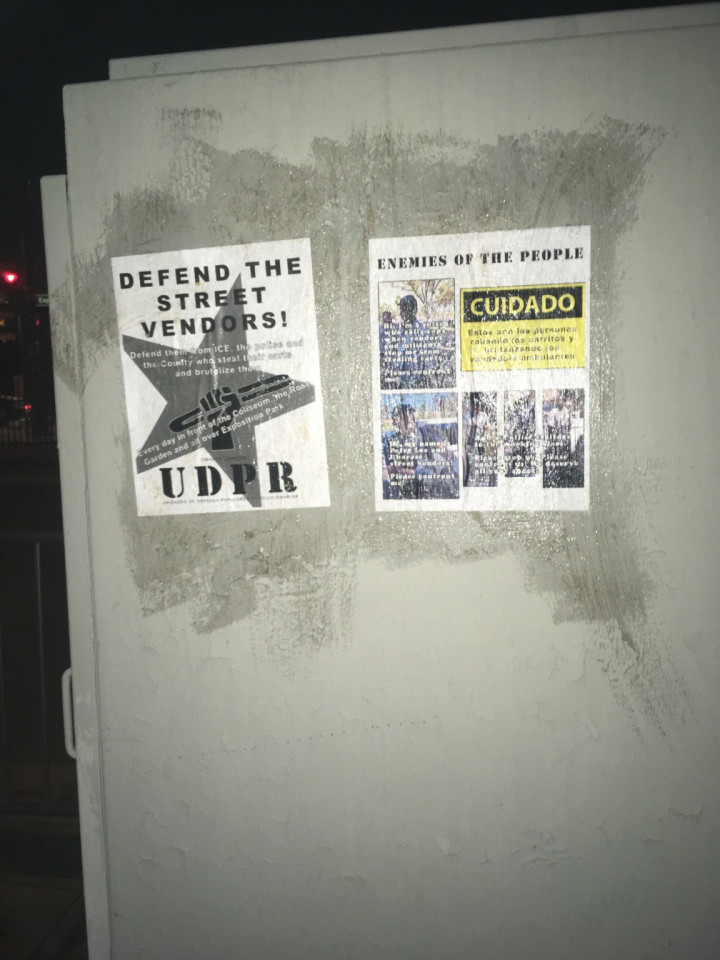
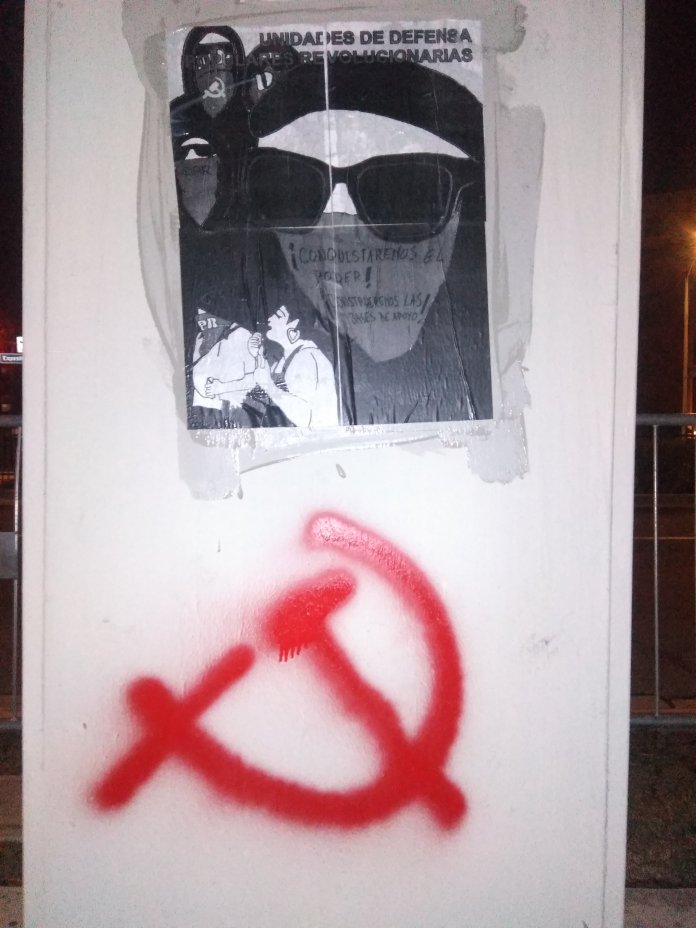
- Details
- Category: Europa
More than 80,000 workers and youths stopped France in a wave of protests against the economic measures of the Macron government on 24 November.
The protests as well as the repression were extremely violent. Police attempted to arbitrarily stop the march of thousands of people with water jets and tear gas bombs as they tried to break through a cordon of isolation that would lead to the house of the prime minister of the country.
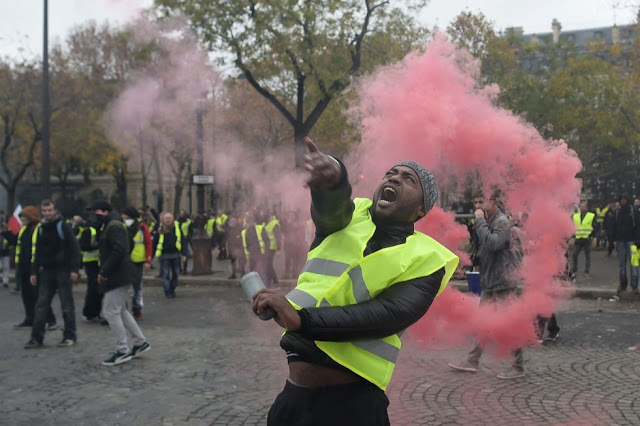
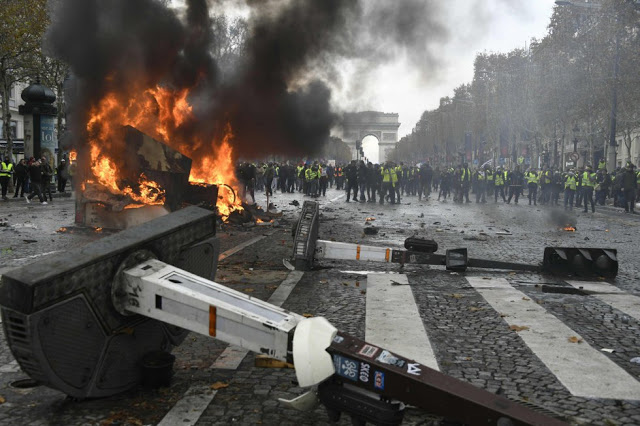
Demonstrators – youth, proletarians and workers with petty-bourgeois living conditions – fought back repression by attacking police cars and big companies shops.
"Mr. Macron has accelerated the fall of his people since he was elected. We want a radical change or the dismissal of Macron, "said a protestor named Cynthia, a 31-year-old worker, in an interview with Portuguese news agency Público. She also denounced that he withdrew taxes "to further enrich the rich."
Five police officers and 19 protesters were injured in the end. A week earlier, November 17, more than 280,000 people took to the streets for the same reason.
THE MEASURES OF MACRON
The measures that are being applied by the government of Macron refer to increase taxation that consumes the salary of the masses while promoting tax exemption for corporations and big bourgeois.
The trigger for the protests was the fuel boom as a result of these Macron policies. What began as a multitudinous economic movement has become widespread and today calls for the Macron government to leave and harshly criticizes the entire political system, parliament and bourgeois democracy itself
Translated from A Nova Democracia
- Details
- Category: Asien
Agents of the Central Reserve Police Force (CRPF) are invading schools in villages and giving lessons to children and young people in Jharkhand state. The villages and districts - many are considered base areas of the Communist Party of India (Maoist) - are Western Singhbhum, Tholkobad, Chhotanagra and Roam, among others. The aim of the police is to force the end of a teachers' strike that has taken place across the state since November 16.
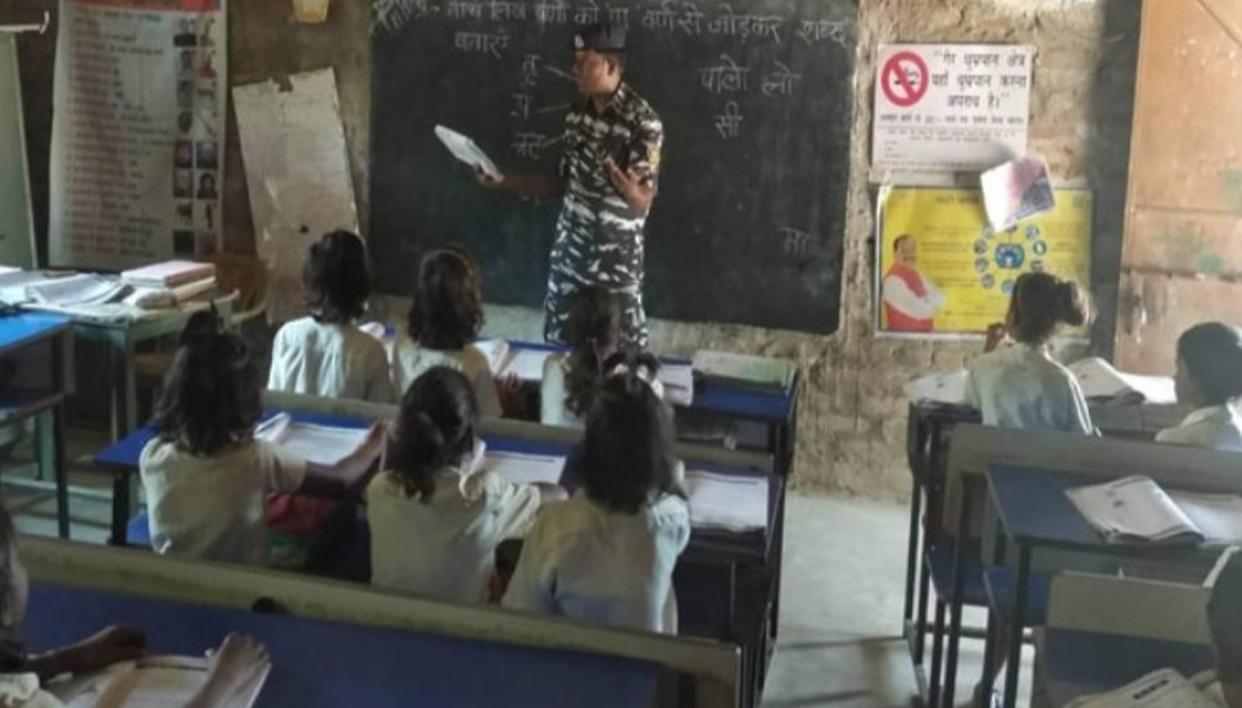
CRPF officers - considered "specialists" in anti-Maoist operations - were summoned by the General Inspector of the Force to invade the schools and continue with the classes "until teachers return to work."
The actions of the CRPF agents seriously undermine teachers' right to strike. But, in addition to breaking the teachers' strike, the aim of the anti-Maoist forces is to raise some prestige that could compensate for the demoralization that the Force has in the region, given their intense participation in repression of peasants and tribal peoples organized by the communists.
Translated from A Nova Democraciaarticle
- Details
- Category: Afrika
Yankee imperialism has been launching a series of unprecedented bombardments against Somalia for two years, under the rhetoric of "combating terrorism". Last year there were more than 31 attacks, according to what was estimated by the United States Command for Africa (Africom) in October of this year. By November 22, the British imperialism’s media The Guardian and other media announced the mark of 33 attacks.
According to The Guardian itself, the attacks represent a grave danger to the civilian population and have failed the goal of destroying the Islamic armed groups that wage armed struggle against the invading foreign forces - coordinated by Yankee imperialism, through the "African Union”.
Of the total number of attacks in 2018, 29 were directed against Al Shabaab ("Combatant Youth Movement"), an organization that, despite its reactionary ideology, has been the main force of the National Resistance.
- Details
- Category: Asien
[source: ikk-online.org]
A Brief Overview of the Syrian Civil War
The economic crisis, in which the imperialist-capitalist system continues to make itself felt more structurally each day, leads to the displacement of some stones in the world. Undoubtedly, the “bleeding wound” of the world, the Middle East is at the very beginning of these stones. On the one hand the restructuring moves, on the other hand the fear of the “21st century uprisings age” once again directed the imperialists’ arrows to the Middle East.
- Details
- Category: Lateinamerika
Ecuador closed the 20th century with an unprecedented economic crisis that lasted until a few years ago, and that in part was avoided by state reforms undertaken by Correa’s bureaucratic regime.
In the period between 1982 and 1999, the GDP fell 7.3% when measure in sucres, and 30.1% when measured in dollars; it went from 19.7 billion to 13.7 billions of dollars. The GDP per capita was reduced by 32%; it collapsed from 1,619 to 1,109 dollars.
The country experienced one of the fastest impoverishing rates in the history of Latin America: between 1995 and 2000, the number of poor people increased from 3.9 to 9.1 million; in percentages, from 34% to 71%; the extreme poverty rate doubled, from 2.1 to 4.5 million, the relative leap was from 12% to 31%. Under these conditions, there was an accelerated deterioration of the living standards. The average income per person reached 43% of the Latin American average.
This was accompanied by a higher concentration of wealth. So, while in 1990 the poorest 20% of people received 4.6% if the total incomes, in 2000 they received only 2.5%; during the same period, the richest 20% of the population increased the amount of money they received from 52% of total incomes to more than 61%.
This bankruptcy was shown and revealed to the world in the form of abrupt emigration of countrymen to the US and Europe.
Nearly 3 million Ecuadorians emigrated to the US and Europe, dimembering homes and abandoning their small and medium-sized properties, which generated an arbrupt process of depopulation of the countryside. Many of these properties were acquired at the price of a "stolen hen" by speculators. This made the greater concentration of land by speculators and big landlords possible.
3 million Ecuadorians who, incredible as it may seem, contributed more than 3 billion a year in remittances for more than 16 years, until the second half of Correa’s regime (2016); the second most important income of foreign currency to the State, second only to oil exports.
That is, the old state not only forcefully sent compatriots to exile, but also parasitized and lived on their remittances for years to satisfy their requirements that ultimately ended up favoring the bureaucratic bourgeoisie who had the ability to continue to produce economically and politically from the state apparatus. In any case, it also benefited the comprator bourgeoisie (the bankers) who were in charge of "legalizing" dollars and euros generated by the emigrants by opening bank branches in Spain and other European countries.
Today, nearly one million Venezuelans have entered Ecuador. Of those, 250,000 have remained to nurture the ranks of unemployment, underemployment, and employment, making the levels of employability in Ecuador more critical.
So, when we see the origins of the emigration of Venezuelans to the rest of the world, we are thinking that the numbers previously exposed about the crisis of bureaucratic capitalism in Ecuador, are the figures that now afflict the masses in Venezuela, and that, in one way or another, they are the samples of bankruptcy that are experienced and caused by bureaucratic capitalism in that country and in others that are characterized in the same way: semi-feudal and semicolonial.
In Venezuela, with a hyperinflation of more than 700%, the economy shrank by 30% from 2013 to 2018; their currency’s buying power was reduced to nothing; 5% of the population has emigrated. 25% of Venezuelan children suffer from chronic malnutrition; prices shot up over 2000%; there was an 11% drop in GDP. The price of a basic basket rose 400%.
Of course, it would be a grave error to say that this crisis was solely caused by Maduro’s mismanagement of the government; it is part of bureaucratic capitalism’s cycle because, whether with Maduro or the comprator right wing in the government, this situation would have happened anyway. Why? Because their economy, which is similar to ours - semi-feudal and semicolonial - is dependent on extractivism and monoproduction; it is incapable of developing a labor force because imperialism does not allow it because it is very comfortable for the bourgeoisie in Venezuela to extract more income from imports and from the mobility of financing capital. But that’s not all. The regime of production relations is semi-feudal and does not allow itself to be “conditioned” to Russian and Chinese capital influence, which, in conflict with Yankee imperialism, destabilizes the anemic productive structure; because it depends on monoproduction (hydrocarbons), the fall of the price of petroleum caused the state budget to collapse and the deficit to become unmanageable. And after all of this, you have to add the criminal imperialist embargo that meant to punish chavismo for getting closer to other imperialist powers.
The inter-bourgeois contradiction is also responsible for adding its own damages. The economic/commercial speculation, sabotage and monopolization that the comprador bourgeoisie exercised also influenced the crisis to become more dramatic for the masses.
Regarding the Venezuelans’ immigration to Ecuador, we have to add the presence of hundreds of thousands of citizens from Colombia, Peru, and Haiti who live in Ecuador as well, where they gain more when sending their earned dollars back home. That is to say, we not only have to withstand the weight of the bureaucratic capitalism crisis in Ecuador, but, in one way or another, the masses have to carry the weight of the bureaucratic capitalism crisis of Venezuela, Colombia, Peru, and Haiti.
We, the Ecuadorian community, know the complexity in emigrating in order to half-way improve the lives of our family while carrying the burden of the bureaucratic capitalism crisis. In this way, we show solidarity with the Venezuelan community who are victims of criminal embargo and Yankee imperialism aggression that spares no means nor measures to neutralize Maduro’s regime. It is evident that the US will not tolerate in the slightest any political manifestation that is not compatible with with its interests; but we also fight the reformist Maduro regime that has been incapable of responding to the expectations of the great majorities to yield to the strengthening of the bureaucratic bourgeoisie that has found its main exponent in the Armed Forces. Hence its relative stability.
The proletariat and Ecuador stand in solidarity with the poor masses in Venezuela, with the struggles, with their firm anti-imperialist position; but note that we will make sure that these thousands of Venezuelans who are now amongst us do not climb the ranks of the reactionary forces of our country, on the contrary, we will make sure that they stand on the side of the people, of the class.
The difficult experiences that the poor masses in Venezuela have had to endure have caused them to stigmatize revolution and socialism characterized by the revolutions that followers of socialism of the XXI century have carried out; the citizen revolution and the Bolivian revolution bring about a discourse of demotivation that is counter revolutionary and favors imperialist and dominante class aspirations.
The government itself is very ambiguous: while on one hand they condemn the Maduro regime for the emigration of citizens, on the other hand they hide the role that the US has played in this meager process while also standing in solidarity with the immigrants, but demanding their passport when they enter; later they raise the conditions required to enter and those faithful to Moreno’s foolishness implement a measure of “solidarity” and “welcome,” but we give them the opportunity to take a free bus that will drop them off at Peru’s border so that they can continue their journey.
This murderous regime continues to show so much stupidity and misery. Fatuous in its own unique way.
The Venezuelan problem must be resolved by the Venezuelans with correct class direction, not only against Yankee imperialism, but also against bureaucratic capitalism and the dictatorship of big landlords and big bourgeoisie that have been recreated by Maduro’s corporate and bureaucratic regime.
Venezuelans must resolve their problems, but being part of the international proletariat, it is the responsibility of the international proletariat to give the Venezuelans all their ideological and political support so that the Venezuelans can follow it with correct class leadership. The international proletariat also has the responsibility to help combat the ruling classes and imperialism in order to lay down the path towards the Revolution of a New Democracy uninterruptedly transiting into socialism.
However, given the conditions in which imperialism would dare invade Venezuela, the international proletariat and oppressed communities around the world are responsible for combining forces in order fight Yankee imperialism on every level, but not as an act intended to defend chavismo and Maduro, but as an act of support, class solidarity, and struggle in favor of the majority in Venezuela who will carry the responsibility of launching a direct and violent fight for national liberation against imperialism and its creole figureheads.
THE BOURGEOISIE AND HUGE LANDLORDS WILL CARRY THE BURDEN OF CAPITALISM’S BUREAUCRATIC CRISIS!
UNMASK THE TRUE CHARACTER OF MADURO’S BOURGEOIS, CORPORATIST, AND REFORMIST REGIME!
THE MIGRATION OF VENEZUELANS IS A PRODUCT OF CAPITALISM’S BUREAUCRATIC CRISIS IN VENEZUELA AND THE CRIMINAL IMPERIALIST EMBARGO!
THE SOLUTION FOR THE MASSES IN VENEZUELA DOES NOT LIE IN MIGRATING, BUT IN STRUGGLING!
We recieved this translation from the article from Frente de defesa de luchas del pueblo.
- Details
- Category: Lateinamerika
On November 14, the weichafe [AT: Mapuche term for warrior] Camilo Catrillanca, 24 years old, was murdered from behind by hands of the Jungla Command. Immediately after, students, residents and workers took to the streets to unleash the contained anger with actions throughout the country.
On the following day, November 15, the Day of National Protest for No More Zones of Sacrifice, that was called by the Open Cabildo [AT: indigenous representative institution] of Quintero-Puchuncaví - in whose territory has been a struggle against the extreme pollution generated by the imperialist and monopolistic companies raging for months - was a true day of popular protest. The streets of Santiago, Concepción and Temuco were a real battlefield for more than 3 hours, where the masses surpassed even the capacities of the police itself, by installing barricades in different points and sabotaging banks, service centers, pharmacies, etc.
